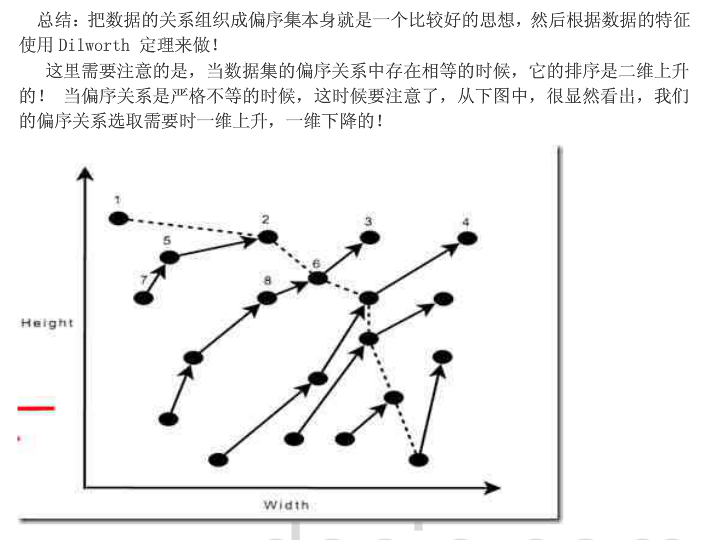poj 3636
2017-10-10 14:56
519 查看
Nested Dolls
http://poj.org/problem?id=3636
Description
Dilworth is the world's most prominent collector of Russian nested dolls: he literally has thousands of them! You know, the wooden hollow dolls of different sizes of which the smallest doll is contained in the second smallest, and this doll is in turn contained in the next one and so forth. One day he wonders if there is another way of nesting them so he will end up with fewer nested dolls? After all, that would make his collection even more magnificent! He unpacks each nested doll and measures the width and height of each contained doll. A doll with width w1 and height h1 will fit in another doll of width w2 and height h= if and only if w1 < w2 and h1 < h2. Can you help him calculate the smallest number of nested dolls possible to assemble from his massive list of measurements?
Input
On the first line of input is a single positive integer 1 ≤ t ≤ 20 specifying the number of test cases to follow. Each test case begins with a positive integer 1 ≤ m ≤ 20000 on a line of itself telling the number of dolls in the test case. Next follow 2m positive integers w1, h1,w2, h2, ... ,wm, hm, where wi is the width and hi is the height of doll number i. 1 ≤ wi, hi ≤ 10000 for all i.
Output
For each test case there should be one line of output containing the minimum number of nested dolls possible.
Sample Input
Sample Output
Source
Nordic 2007

不是很懂这个排序
上题是最长严格递减子序列,这题是最长不上升子序列
http://poj.org/problem?id=3636
| Time Limit: 1000MS | Memory Limit: 65536K | |
| Total Submissions: 8630 | Accepted: 2367 |
Dilworth is the world's most prominent collector of Russian nested dolls: he literally has thousands of them! You know, the wooden hollow dolls of different sizes of which the smallest doll is contained in the second smallest, and this doll is in turn contained in the next one and so forth. One day he wonders if there is another way of nesting them so he will end up with fewer nested dolls? After all, that would make his collection even more magnificent! He unpacks each nested doll and measures the width and height of each contained doll. A doll with width w1 and height h1 will fit in another doll of width w2 and height h= if and only if w1 < w2 and h1 < h2. Can you help him calculate the smallest number of nested dolls possible to assemble from his massive list of measurements?
Input
On the first line of input is a single positive integer 1 ≤ t ≤ 20 specifying the number of test cases to follow. Each test case begins with a positive integer 1 ≤ m ≤ 20000 on a line of itself telling the number of dolls in the test case. Next follow 2m positive integers w1, h1,w2, h2, ... ,wm, hm, where wi is the width and hi is the height of doll number i. 1 ≤ wi, hi ≤ 10000 for all i.
Output
For each test case there should be one line of output containing the minimum number of nested dolls possible.
Sample Input
4 3 20 30 40 50 30 40 4 20 30 10 10 30 20 40 50 3 10 30 20 20 30 10 4 10 10 20 30 40 50 39 51
Sample Output
1 2 3 2
Source
Nordic 2007

不是很懂这个排序
上题是最长严格递减子序列,这题是最长不上升子序列
#include<cstdio>
#include<iostream>
#include<algorithm>
#define N 20001
using namespace std;
struct node
{
int a,b;
}e
;
int s,f
;
bool cmp(node p,node q)
{
if(p.a!=q.a) return p.a<q.a;
return p.b>q.b;
}
int find(int w)
{
int l=1,r=s,mid,tmp=-1;
while(l<=r)
{
mid=l+r>>1;
if(f[mid]<w) tmp=mid,r=mid-1;
else l=mid+1;
}
return tmp;
}
int main()
{
int T,n,pos;
scanf("%d",&T);
while(T--)
{
scanf("%d",&n);
for(int i=1;i<=n;i++) scanf("%d%d",&e[i].a,&e[i].b);
sort(e+1,e+n+1,cmp);
f[s=0]=2e9;
for(int i=1;i<=n;i++)
if(e[i].b<=f[s]) f[++s]=e[i].b;
else
{
pos=find(e[i].b);
if(pos>0) f[pos]=e[i].b;
}
printf("%d\n",s);
}
}
相关文章推荐
- POJ 3636 Nested Dolls
- poj 3636 Dilworth定理(嵌套方形娃娃) Dilworth定理详细讲解
- POJ 1065 & 3636的区别
- POJ 3636 Nested Dolls
- 【最长非升子序列+nlog(n)】北大 POJ 3636 Nested Dolls
- POJ 3636 Nested Dolls
- POJ 3636 Nested Dolls
- poj 3636 Nested Dolls 动态更新表的二分查找
- POJ 3636 俄罗斯Nested Dolls 贪心二分 动态规划
- UVA 11368 & POJ 3636 & HDU 1677 Nested Dolls(贪心 + 二分LIS)
- poj 3636
- poj3636 Nested Dolls
- POJ 3636 POJ 1065 (Dilworth定理)
- poj 3636
- poj 1014 Dividing
- POJ_2663_Tri Tiling_DFS,状态压缩,动态规划
- POJ2484 A Funny Game (典型博弈论)
- poj The Suspects(并查集)
- POJ 2656 Unhappy Jinjin
- POJ_1511_Invitation Cards【双向最短路】
